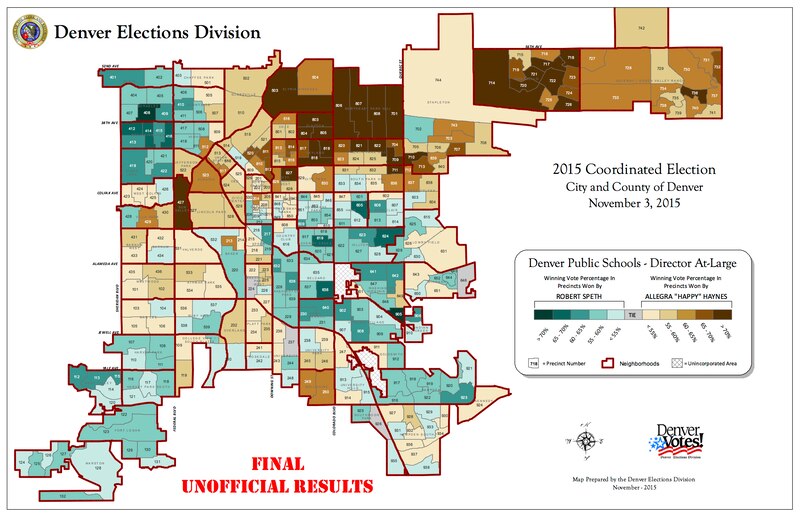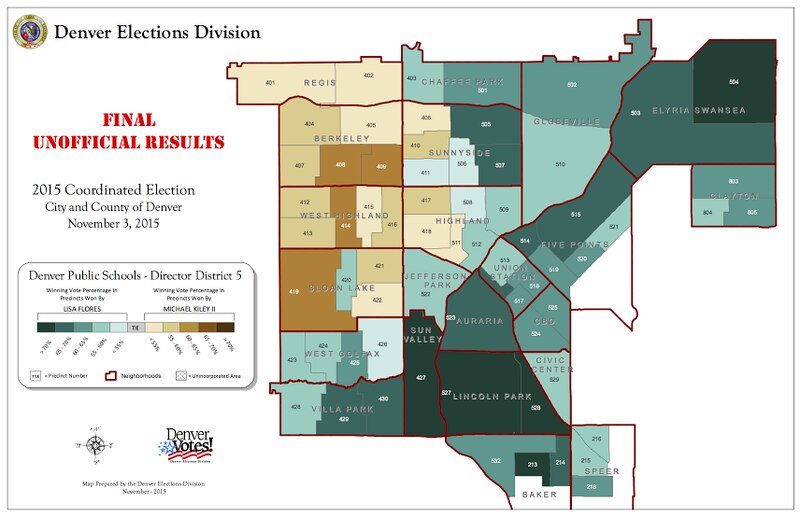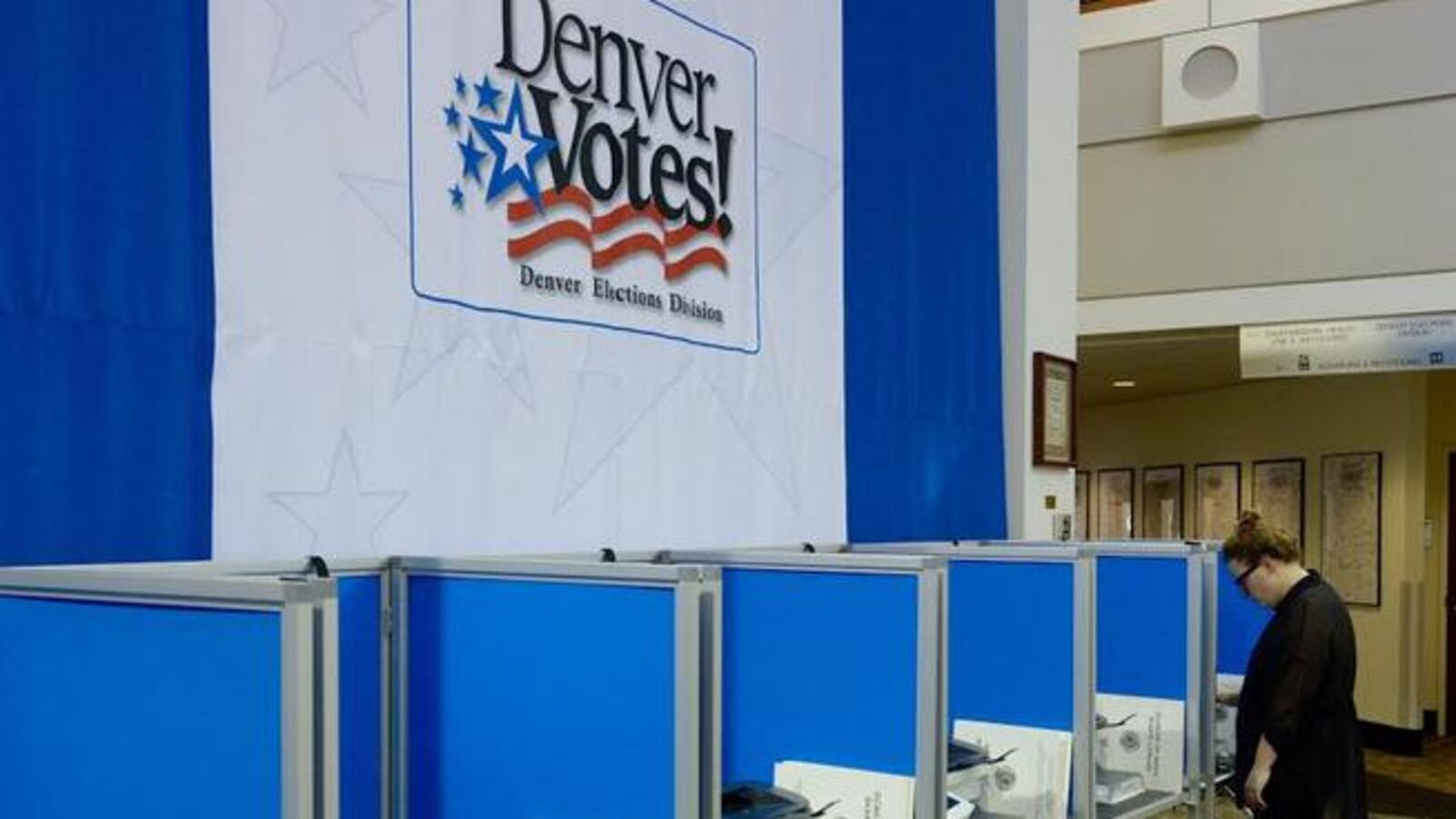This week’s Denver school board election — which featured one unexpectedly close call and two more comfortable wins — means all seven seats will be occupied by strong advocates of the district’s decade-long path of reform.
Board president Allegra “Happy” Haynes recovered from a slow campaign start and questions about her new role heading the city’s parks and recreation department to eke past northwest Denver parent Robert Speth, a political unknown credited for running an effective campaign.
In the race for an open seat in northwest and west Denver, education reform supporter Lisa Flores defeated board critic Michael Kiley by a healthy margin, 53 to 47 percent. Flores claimed more individual donors than any other candidate — and benefited from the generosity of an independent political committee — while campaigning on a platform of looking out for all her district’s kids.
Board vice president Anne Rowe easily held onto her seat against challenger Kristi Butkovich, picking up every precinct in southeast Denver’s District 1.
Throughout the campaign, the three candidates critical of the board’s direction sought to convince voters that dissenting voices were needed. All three lost their races. About 19 percent of registered voters cast ballots in Denver.
Now that the campaign is over, attention will turn to whether the next board will stand as a united front or diverge on contentious issues that lie ahead, including a proposed policy that would draw a bright line for when the districts should close persistently struggling schools.
A close at-large race
A late start, questions about potential conflicts of interest and a virtually unknown challenger who proved to be a formidable opponent turned what many thought would be an easy re-election for Haynes, an established Denver political figure, into a battle.
“None of us expected Happy to have an active race,” said Jeani Frickey Saito, executive director of Stand for Children Colorado, an education reform group that endorsed Haynes.

That changed when Speth, a father of two who works in the telecommunications industry, entered the race in late August. In October, just one month before the election, Haynes ramped up her fundraising. In two weeks, she raised more than four times as much as she had the previous year — and she began spending it on mailers, Facebook ads and robocalls.
“When you’ve got a candidate who’s not anticipating having to run a contested campaign, it’s going to feel a little rushed and (there’s) a sense of urgency there that wasn’t before,” Frickey Saito said. “For the process, it’s always good to have contested races and give voters a choice, and it’s good to know that when given a choice, they supported Happy’s work.”
In the end, Haynes hung on to her seat by a small margin. Haynes’ strongest showing was in northeast Denver, while Speth performed well in his home turf of northwest Denver and in southeast Denver:

“We’re all glad the campaign is over,” Haynes said Wednesday. “For those of us who are continuing, it’s an opportunity to have our full focus on the challenges we have ahead of us.”
Haynes said she figured the race would be close. As to why, she said, “I can’t really speculate,” adding that her campaign “didn’t do any of this, ‘Why is this happening? Why isn’t it?’”
Asked what she was hearing from voters, Haynes said, “What we heard was people who were supporting us or people who said, ‘No, we’re not.’ We weren’t diving into people’s reasons for and against. In a campaign, you’re trying to get people to vote for you. When they do, you say, ‘Great,’ and you move on to the next. When they say they’re not, you say, ‘Thank you anyway.’”
Some political observers said Haynes’s September appointment by Mayor Michael Hancock to head the city’s parks and recreation department may have given voters pause. In October, the Denver Board of Ethics said it was fine for Haynes to hold both the $139,293-a-year job and a volunteer seat on the Denver school board.
Frickey Saito characterized the issue as “an unfortunate distraction.” Others said it was a valid concern.
“I think people didn’t feel good about Happy having both jobs,” said former city councilwoman Susan Barnes-Gelt.
“The fact that it was that close against a guy nobody ever really heard of and got into the race late, and it was fundraised to the max, I don’t think anybody should be doing a victory dance,” she said.

Speth, the guy nobody ever really heard of, ended up running an effective campaign, observers said. Speth was endorsed by the Denver Classroom Teachers Association. Union president Henry Roman said he was impressed by the newcomer’s determination, accessibility and ability to explain his positions.
“He is very dynamic,” Roman said. He recalled that the first time he invited Speth to meet with union building representatives, the reps ended up following the candidate outside to get yard signs. “I said, ‘This is a special kind of guy,’” Roman said.
Speth did not return phone calls for this story. But on Tuesday night, as he watched the election results roll in from a bar on Tennyson Street, he said his final campaign push involved knocking on doors, handing out fliers and “getting in front of many folks as we could.”
On Election Day, Speth said he took his kids to school, took down his Halloween decorations and waited.
When he left that bar at 11 p.m., he was winning. But by the time the final unofficial election results were tallied at 4 a.m., he had lost. The results will be finalized later this month.
A divided map in District 5
The results in District 5 show that support for candidate Kiley was concentrated in northwest Denver. The software company program manager, who lives in the Berkeley neighborhood with his wife and two kids, won every precinct in the Regis, West Highland and Berkeley neighborhoods. He also won several precincts in Sunnyside, Highland and Sloan’s Lake.
Flores, a former senior program officer with the Denver-based Gates Family Foundation, swept the precincts in the central and eastern part of the district, winning neighborhoods including Elyria Swansea, Globeville, Five Points and Lincoln/La Alma Park. Flores lives in West Highland, where she and her husband are helping to raise her nephew.

“We were cognizant that there are over 50 schools that make up District 5,” Flores said. She said her campaign made an effort to “reach out to all communities served by District 5.”
Meanwhile, Kiley said he focused on neighborhoods outside of northwest Denver where he was lesser known. The challenge, he said, was getting those voters to relate to his experience of working to improve northwest Denver schools, such as Skinner Middle School and North High.
The gains at those schools and others like them were achieved due to “a common theme of parents working with the principal plus resources equals a better school,” he said. “When we talk about our experience,” he added, “there are schools that sound a million miles away.”
On Tuesday, Kiley won 9,295 votes and Flores won 10,675, according to the final unofficial tally.
A unified board?
Haynes, Rowe and Flores will be sworn in Nov. 19.
All three received financial support from a committee affiliated with Democrats for Education Reform, as well as a network of local and national pro-reform donors.
Outgoing board member Arturo Jimenez, who has represented District 5 since 2007 and is term-limited, was the last union-backed board member. He often served as a dissenting voice in difficult discussions.

Union president Roman said he hopes that the new board “continues to engage in collaboration” with teachers, parents and the community. But he noted that more power also means more responsibility.
“If something is taken too far, there will eventually be a pushback,” Roman said. The successful recall election in Jeffco is an example of that, he said.
Roman was hesitant to say how far would be too far in Denver. But he said the board needs to step up its oversight of charter schools, work to reduce the teacher-turnover rate and listen to parents and teachers on issues such as co-locating schools in the same building.
“My hope is that we can have conversations to come up with common-sense, good policies,” he said.
Others were less judicious in their assessment.
“Regular people will have less and less voice,” predicted C.L. Harmer, who served as Kiley’s campaign manager.
“I think rubber stamp is a fair label,” Kiley said. He echoed Roman in saying that whatever policies the new board enacts, the members will have to take full responsibility for how the policies play out. “If it works, hats off to them,” he said. “If it continues to struggle, they own it.”
Flores said that when she met with the teachers union, she assured union leaders that no matter who they endorsed, she would be “a great representative for them.”
“I think there were some differences sometimes on specific policy stances,” Flores said, “but when we look at underlying values and how we want to respect and honor teachers, I think there’s a lot of alignment and a lot of areas where we can work together.”
Denver independent political analyst Eric Sondermann said he doesn’t think the new calculus of the board will make much of a difference when it comes to the board’s actions.
“I don’t know that it makes a huge difference to have a 7-0 majority rather than a 6-1 majority,” he said. “It will probably make people on the other side more aggrieved to not have a spokesperson. But to have a spokesperson, you need to win an election. Ultimately, I think there are a strong majority of Denver residents who have endorsed the general direction of the district.”

Flores rejected the suggestion that her victory means the board is 7-0.
“I hope that we can move past the point where people are talking about a three-four board, a six-one board, a seven-oh board,” she said Wednesday. “I’ve been saying from the beginning, I am not running for or against DPS. I am running for the students of DPS. I am a strong woman who is not afraid to have her voice heard and I will be an independent member of this board.”
Jen Walmer, director of the Colorado chapter of Democrats for Education Reform, which supported Flores, Haynes and Rowe, attributes the closeness of the at-large race to the fact that there were two candidates, instead of five like in 2011 when Haynes first ran for a seat.
“We always have to remember that when two people are running, the choice becomes more stark,” she said. Walmer said both candidates ran “real campaigns.” But ultimately, she said, “voters in Denver looked at Happy’s track record and came out in her favor.”
Outgoing board member Jimenez sees the results differently.
“It’s great to see the city spoke in protest against the establishment with all of the votes for Robert Speth,” he said Tuesday night when early results showed Speth with a slight lead.
Haynes said her tight race won’t change the way she approaches her work on the board.
“We have a lot to do and we need to get refocused on where we have to go,” she said. “And that’s what I will continue to do: look at all of the issues, try to find solutions to things we think aren’t working well and to move forward.”
Editor’s note: Chalkbeat receives financial support from the Gates Family Foundation.
Correction: Due to an editing error, an earlier version of this story misstated which campaign raised the most money according to the most recent campaign finance reports. Kiley narrowly brought in more money than Flores.

